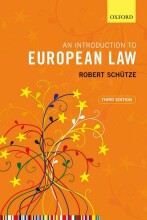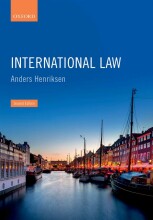Summary: An Introduction To European Law | 9780198858942 | Robert Schütze
- This + 400k other summaries
- A unique study and practice tool
- Never study anything twice again
- Get the grades you hope for
- 100% sure, 100% understanding
Read the summary and the most important questions on An Introduction to European Law | 9780198858942 | Robert Schütze
-
1 Learning objectives problem 2
This is a preview. There are 5 more flashcards available for chapter 1
Show more cards here -
How is the European Parliament composed?
It is composed out of 'representatives of the people of the States' -
How are the members of the European Parliament elected?
They do not follow a uniform electoral procedure in all Member States. There are elections every 5 years in every Member State. In Holland it is the same way as the TK verkiezingen. -
Can you run for parliament when you are in not in country of citizenship?
Yes you can. -
There are 2 councils, which two?
- General affairs council
- Foreign affairs council
art. 16.6 TEU, only two councils mentioned in the law.
The committees assist the councils. -
Who are allowed to be in the Council of Ministers?
The council shall consist of a representative of each Member State at ministerial level, who commit to the government of the Member State in question and cast its vote. -
Of what consists the European Commission?
Itconsists of one national from each Member State. They do not take instructions from governments and so are independent. They are called eurocommmisionarss. -
How are the members of the Commission chosen?
The members areselected on the ground of their generalcompetence and European commitment from persons whoseindependence is beyond doubt. -
How are the Commission members elected?
There are 2stages :
1 -> the President will be elected. You must benominatedby European council and almost always it is thefrontman of the biggest political party in a state. TheParliament has to approve, if not? A new member from probably a different state has to be found by the European Council.
2 -> a list ofcandidates is set up by the Council based onsuggestions made by the Member States (national element). The commissionshall beappointed by the European Council (international element). -
1.3 In which articles are the most important EU intitutions and their mandates set out?
-
In which articles are the most important EU institutions and their mandates set out?
Article 13 TEUEUropean Parliament
EuropeanCouncil
TheCouncil
The european commision
The court of Justice of the European Union
The europeanCentral Bank
The Court ofAuditors Article 14 - 19 TEU:Mandates (authorizations) (bevoegdheden) of each institution -
1.4 How does the ordinary legislative procedure work?
This is a preview. There are 1 more flashcards available for chapter 1.4
Show more cards here -
How does the ordinary legislative procedure work? (7 stages)
Article 294 and 297
1. Proposal stage (EC)
2. First reading, EP can reject, approve or amend. Council votes by QMV.
3. Second reading (EP approves, rejects or amends Council's position > Council approves all amendments formele wijziging van een officieel document or bill goes to conciliation stage)
4. Conciliation stage overlegfase. Conciliation Commission to draft a joint text)
5. Third reading (formal approval or rejection of joint text by EP and Council)
6. Signing by President of the EP & Council President)
7. Publication ( official journal of the European union
- Higher grades + faster learning
- Never study anything twice
- 100% sure, 100% understanding
































